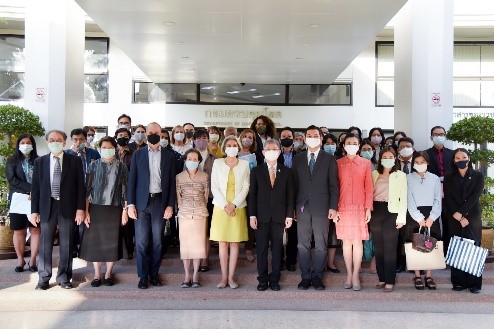United Nations Thematic Working Group on NCD Prevention and Control
Noncommunicable diseases (NCDs) are responsible for 74% of all deaths in Thailand each year. Multisectoral action is central to controlling NCDs; the health sector alone cannot address NCDs and their underlying social determinants and risk factors. To strengthen multisectoral action to reduce NCD risk factors, in 2018, at the invitation of the Government of Thailand, the WHO Country Office in Thailand organized a joint programming mission of the United Nations Interagency Task Force on the Prevention and Control of Non-Communicable Diseases. Results of the joint mission included a set of 17 recommendations designed to scale-up Thailand’s response to the NCD epidemic. The outcome of some of these recommendations is already evident, for example: plain packaging of tobacco products has been introduced and a law on restricting marketing of unhealthy food and beverages to children is in progress. Following the United Nations Interagency Task Force mission, as suggested by the Task Force, a United Nations Thematic Working Group on NCD Prevention and Control in Thailand was established to follow-up on recommendations of the joint mission. The WHO Country Office facilitated and coordinated partners, prepared terms of reference, organized meetings and acted as the Secretariat to drive the working group. The working group and the WHO Country Office facilitated multisectoral action to implement the recommendations. During its two-year term, 2020-2021, the United Nations Thematic Working Group, the WHO Country Office and the Government of Thailand tackled NCDs using time-bound goals.

How did Thailand do it, and how did the WHO Secretariat support Thailand?
- Multisectoral engagement – With human resources provided by the WHO Country Office to facilitate, coordinate and manage the United Nations Thematic Working Group, non-health sector stakeholders from government, civil society organizations and academia collaborated. Supported by the three levels of WHO, the working group provided an effective platform for WHO Country Office joint activities with the United Nations Development Programme (UNDP), the United Nations Children's Fund (UNICEF), and stakeholder commitment to meet Sustainable Development Goal targets for NCDs. The WHO Country Office and UNDP contributed to Thailand’s NCD investment case, developed policy briefs for multisectoral actions on NCDs to be taken by seven ministries, and produced the Thailand NCDs Progress Tracker.
- Increased advocacy – The United Nations Thematic Working Group increased advocacy for effective and sustained multisectoral action against NCDs. With technical support and convening power provided by the three levels of WHO, the working group was able to advocate for policy development and accelerate multisectoral actions by non-health ministries and other United Nations agencies in Thailand. Funding and human resources provided by the WHO Country Office facilitated the production of reports and advocacy materials, including a joint WHO/UNDP op-ed for World No Tobacco Day 2021. WHO and UNICEF collated international best practices and assisted the Department of Health in developing a regulation to ban inappropriate marketing of unhealthy food and beverages to children.
The United Nations Thematic Working Group had no formal authority in the country and therefore could not enforce activities. Participation of United Nations agencies and ministries was variable and resources for frequent intensive engagement and activities were insufficient. Maintaining high-level commitment was challenging and performance could have been more closely monitored and reported to sustain momentum on NCD actions.
Recommendations of the United Nations Thematic Working Group included:
- High-level commitment by all stakeholders ensures motivation, momentum and change. The United Nations can play a catalytic role as a mobilizer and integrator.
- The NCD coordination mechanism needs equal decision-making power as ministerial departments and government agencies.
- Consider extending membership of the United Nations Thematic Working Group to the private sector, recognizing its role in mobilizing wide support and shaping policy on NCDs and their risk factors.
- Consider integrating NCD coordination mechanisms into broader country-specific development frameworks or multisectoral networks to use synergies and avoid duplication.
- The United Nations Thematic Working Group should agree on targets and goals at the outset.
- Communication, advocacy and outreach ensure that NCD prevention and control strategies are accepted by non-health ministries and communities.
- Human and financial resources for NCD coordination mechanisms are essential for coordination, progress and success.
The United Nations Thematic Working Group became known as an example of best practice for multisectoral collaboration on NCDs, both nationally and globally and was highlighted in the 2021 report of the WHO Director-General to the United Nations Economic and Social Council [1].

Photo Credit: © Raiwin Wantaweesub/WHO Country Office in Thailand
Photo Caption: Walk the Talk; a group stretch break during the fourth meeting of the United Nations Thematic Working Group on NCD Prevention and Control, 2021.
REFERENCES
[1] United Nations
Inter-Agency Task Force on the Prevention and Control of
Non-communicable Diseases: Note by the Secretary-General
(E/2021/48/Rev.1) https://www.un.org/ga/search/view_doc.asp?symbol=E/2021/48/Rev.1
Photo Credit: © Ploy Phutpheng/WHO Country Office in Thailand
Photo Caption: Representatives of ministries and United Nations agencies of the 3rd meeting of the United Nations Thematic Working Group on NCDs, 2020
